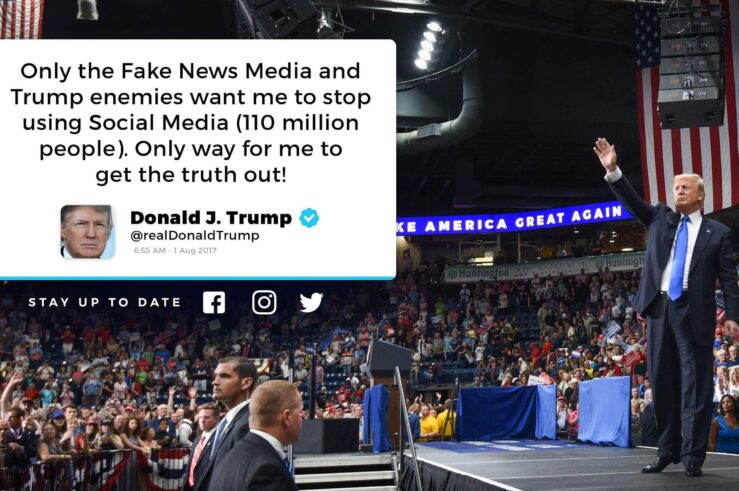Showing archive for: “Intermediary Liability”
The Dishonesty of Conservative Attacks on Section 230
President Donald Trump has repeatedly called for repeal of Section 230. But while Trump and fellow conservatives decry Big Tech companies for their alleged anti-conservative bias, including at yet more recent hearings, their issue is not actually with Section 230. It’s with the First Amendment. Conservatives can’t actually do anything directly about how social media ... The Dishonesty of Conservative Attacks on Section 230
Conservatism and the Section 230 Debate: Applying First Principles
Over at the Federalist Society’s blog, there has been an ongoing debate about what to do about Section 230. While there has long-been variety in what we call conservatism in the United States, the most prominent strains have agreed on at least the following: Constitutionally limited government, free markets, and prudence in policy-making. You would ... Conservatism and the Section 230 Debate: Applying First Principles
How does antitrust measure nonprice effects like political bias?
In the latest congressional hearing, purportedly analyzing Google’s “stacking the deck” in the online advertising marketplace, much of the opening statement and questioning by Senator Mike Lee and later questioning by Senator Josh Hawley focused on an episode of alleged anti-conservative bias by Google in threatening to demonetize The Federalist, a conservative publisher, unless they ... How does antitrust measure nonprice effects like political bias?
Senator Hawley’s Unconstitutional, Unconservative Attack on the Internet
Twitter’s decision to begin fact-checking the President’s tweets caused a long-simmering distrust between conservatives and online platforms to boil over late last month. This has led some conservatives to ask whether Section 230, the ‘safe harbour’ law that protects online platforms from certain liability stemming from content posted on their websites by users, is allowing ... Senator Hawley’s Unconstitutional, Unconservative Attack on the Internet
The Earn IT Act and the Institutional Limits of Congress
As the initial shock of the COVID quarantine wanes, the Techlash waxes again bringing with it a raft of renewed legislative proposals to take on Big Tech. Prominent among these is the EARN IT Act (the Act), a bipartisan proposal to create a new national commission responsible for proposing best practices designed to mitigate the ... The Earn IT Act and the Institutional Limits of Congress
ICLE Files COPPA Review Comments Arguing the FTC Should Repeal the 2013 Amendments
Today, I filed a regulatory comment in the FTC’s COPPA Rule Review on behalf of the International Center for Law & Economics. Building on prior work, I argue the FTC’s 2013 amendments to the COPPA Rule should be repealed. The amendments ignored the purpose of COPPA by focusing on protecting children from online targeted advertising ... ICLE Files COPPA Review Comments Arguing the FTC Should Repeal the 2013 Amendments
What’s the Harm of Targeted Ads on Children’s Content Anyway?
The FTC’s recent YouTube settlement and $170 million fine related to charges that YouTube violated the Children’s Online Privacy Protection Act (COPPA) has the issue of targeted advertising back in the news. With an upcoming FTC workshop and COPPA Rule Review looming, it’s worth looking at this case in more detail and reconsidering COPPA’s 2013 ... What’s the Harm of Targeted Ads on Children’s Content Anyway?
The Third Circuit’s Oberdorf v. Amazon opinion offers a good approach to reining in the worst abuses of Section 230
[Note: A group of 50 academics and 27 organizations, including both myself and ICLE, recently released a statement of principles for lawmakers to consider in discussions of Section 230.] In a remarkable ruling issued earlier this month, the Third Circuit Court of Appeals held in Oberdorf v. Amazon that, under Pennsylvania products liability law, Amazon ... The Third Circuit’s Oberdorf v. Amazon opinion offers a good approach to reining in the worst abuses of Section 230
There’s nothing “conservative” about Trump’s views on free speech and the regulation of social media
Yesterday was President Trump’s big “Social Media Summit” where he got together with a number of right-wing firebrands to decry the power of Big Tech to censor conservatives online. According to the Wall Street Journal: Mr. Trump attacked social-media companies he says are trying to silence individuals and groups with right-leaning views, without presenting specific ... There’s nothing “conservative” about Trump’s views on free speech and the regulation of social media
Section 230 principles for lawmakers and a note of caution as Trump convenes his “social media summit”
Neither side in the debate over Section 230 is blameless for the current state of affairs. Reform/repeal proponents have tended to offer ill-considered, irrelevant, or often simply incorrect justifications for amending or tossing Section 230. Meanwhile, many supporters of the law in its current form are reflexively resistant to any change and too quick to dismiss the more reasonable concerns that have been voiced. Most of all, the urge to politicize this issue — on all sides — stands squarely in the way of any sensible discussion and thus of any sensible reform.
Trade Agreements and Restatements as End Runs Around the Rule of Law
The Internet is a modern miracle: from providing all varieties of entertainment, to facilitating life-saving technologies, to keeping us connected with distant loved ones, the scope of the Internet’s contribution to our daily lives is hard to overstate. Moving forward there is undoubtedly much more that we can and will do with the Internet, and ... Trade Agreements and Restatements as End Runs Around the Rule of Law
Jacobson on the Apple ebooks case: It is hard to find an easier antitrust case than United States v. Apple
Try as one may, it is hard to find an easier antitrust case than United States v. Apple. Consider: The six leading publishers all wanted to prevent Amazon and others from offering best seller e-books at $9.99 (or other similar low prices). The problem, however, was that they had no mechanism for accomplishing that result. Then ... Jacobson on the Apple ebooks case: It is hard to find an easier antitrust case than United States v. Apple







